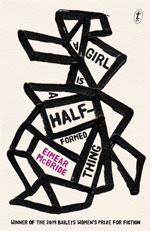
In A Girl is a Half-Formed Thing, Eimear McBride takes you inside a young woman’s mind teeming so violently, body pained so volcanically, soul torn so profoundly that you’re left shaking by the last page … if you last to that point. You might not. As McBride inhabits this character at the cellular level, the effect is scorchingly intimate, uncomfortable, unbearable and possibly unreadable for some at times. The rewards and insights are great, though, for the reader that can persevere with this thorny, brilliant debut novel.
This young woman gives vivid voice to her troubled upbringing, her sexual abuse at the hands of a manipulative family member, and the self-abuse she plunges into to simultaneously feel and not feel what has happened to her. That voice is only tempered with tenderness and sweet, wry humour when she speaks of and to her brother, set back in his own life’s progress by early childhood illness that comes back to afflict him and unravel their already fractured family.
While always defiant and spirited, that vivid voice is not entirely discernible, however. Spewing a churning wellspring of language that is somehow both dense and fragmented, this unforgettable narrator’s words regularly tumble into inarticulate ranting, but can just as easily take exuberant flight as she wields her unique form of black humour. Even as strict meaning is sometimes blurred, though, you will somehow manage to feel, sometimes be strangely charmed and almost constantly be rendered uncomfortable but still compelled by this woman’s intensity, however desperate, misguided and destructive she is, to herself and those she loves.
Through her voice, you also gain a powerful sense of her physical presence. As striking and verging on impossible it is to take in the indignities visited upon her and that she seeks out, it is a comparatively minor impertinence with her deceased grandfather that oddly but most affectingly connects with the physical intimacy, sympathy and even empathy of the final days with her brother. Even if some of her capacity for fearless physical connection has been made in the most horrific ways, you can’t help but feel a breathless, twisted admiration at her perverse determination to survive.
Her particular ability to understand her brother’s confusion and humiliation is both disquieting and profoundly moving to witness – and still, miraculously, leavened with that feisty dark humour – even when her beloved sibling’s existence has ground down to the miserably mundane. Somehow, she alchemizes that misery into something expiatory and transcendent:
“Something. Words words. I’ll go on my own. Your temper that’s the devil up. Normal almost sight again. Pull the bed but melt like water. Gone to hell. All your muscles. You’d give me a hit but can’t. I. There. Lie back. Lie back. You have to. Don’t do this you say.
“Don’t. You have to. And I turn away. I say. Just go don’t worry it’s. Normal now. It’s fine. You. Strapped up in your body. You don’t live there. I. Don’t look. I hear you. Crying.
“Going in the nappy. Rage. Not fair. Not fair. You wait til I’m well. You can definitely kill me then I say.
“Quiet.
“Turn and you are back asleep. I. Know I life the cover. Clean up. And now you’re gone fast far. Breathing. Don’t see me. Don’t know I do. New one. Clean you. Put it in the bin. See. My one act. I might be a person. Beneath the. Where horrible can be a good act of contrition. Shush there. You there sleeping. My boy. My brother. Wish my eye for yours tooth for your tooth. You’re a better. No. It’s all fuck gone. Gone to the gone to the wrong wrong wrong. Be shush for you. I can.”
A Girl is a Half-Formed Thing is perhaps best read in as few sittings as possible to stay with the narrator’s linguistic and emotional rhythms. Ironically, maintaining that sustained attention is like gazing into the sun. You have to stop. You have to look away. You have to take a breath before resuming. In particular, the book’s last 50 pages (pretty much the entirety of Part V, The Stolen Child, an at least two-pronged title) are suffocatingly intense and emotionally lacerating as the heroine’s – yes, she is heroic – anguish reaches a crescendo.
A Girl is a Half-Formed Thing joins admirably other works known for distinctive if fractious voices that veritably leap off the page. The comparisons to Joyce are plentiful and warranted. More titles that come to mind include Pigeon English by Stephen Kelman and How late it was, how late by James Kelman.
Eimear McBride’s admiration of James Joyce and Edna O’Brien is immense and unabashed, as she reveals in this Guardian essay. Her tribute to Joyce can also be well applied to the rewards to the reader who stays with A Girl is a Half-Formed Thing to the end:
Difficulty is subjective: the demands a writer makes on a reader can be perceived as a compliment, and Joyce certainly compliments his readers in what he asks of them.
See also:
-
Eimear McBride: a genius easily missed
People are full of praise for our decision to publish A Girl Is a Half-formed Thing. But it would not have been hard to pass
(The Guardian Books Blog) -
A book for the beach: A Girl is a Half-formed Thing by Eimear McBride
The austere, disjointed beauty of this intense account of broken family life is perfectly suited to the raw drama of a Clydeside coast
(The Guardian Books Blog) -
Review and discussion – A Girl is a Half Formed Thing – Eimear McBride (2013) by heavenali
Thank you to Simon and Schuster Canada for providing a review copy of A Girl is a Half-Formed Thing, by Eimear McBride.

Superb review. It’s a complex book in many ways and I found it hard to review.